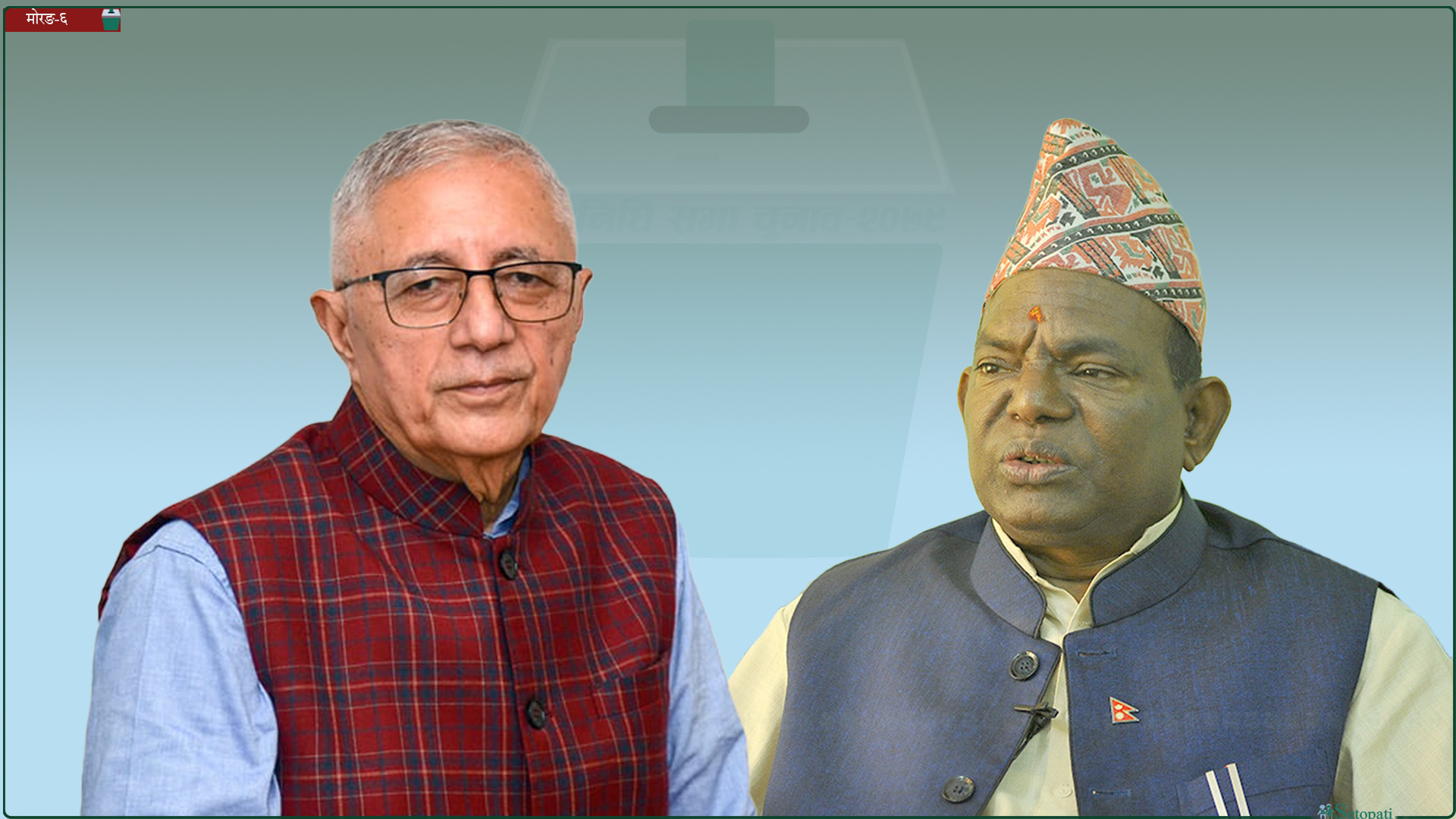Common coalition candidate from Nepali Congress (NC) Shekhar Koirala seems set for an easy victory over Lal Babu Pandit of CPN-UML who had defeated him by 675 votes in the House of Representatives (HoR) constituency of Morang-6 in 2017 .
The constituency includes Budhiganga Rural Municipality, ward numbers 4, 5, 6, 7, 9, 11 and 12 of Biratnagar Metropolitan City and ward numbers 2-7 of Sundarharaicha Municipality.
NC is the strongest party in the constituency based on the votes received by the parties at the ward level in recent local election securing 28,428 votes. UML is second with 25,536 while CPN (Maoist Center) received 5,356 and CPN (Unified Socialist) 2,369. The ruling coalition in this way was ahead of UML by more than 10,000 votes in the recent local election.
Setopati reached almost all the wards in the constituency and talked with 252 voters about the upcoming election, their preferred parties/candidates, the reasons for their preference, and the most important issues for them among other things.
Eighty-two (32.5%) said that they would vote for coalition’s Koirala while just 39 (15.5%) said that they would vote for UML’s Pandit.
Twenty-six (over 10%) said they would vote on bell of Rastriya Swatantra Party led by Rabi Lamichhane. Some of those pledging to vote on bell, interestingly, could not name the party’s candidate in the constituency Yadav Kumar Pradhan.
Twenty-one (over 8%) said that they would vote for RPP’s Gopal Chhetri Katuwal and 30 pledged to vote for different independent candidates.
A total of 54 (over 21%) said that they had yet to decide who to vote for.
The 252 voters we talked to included 94 who had voted for NC’s Koirala and 89 for Pandit depicting how close the last election was.
But only 27 of the 89 who had voted for Pandit five years back will again vote for him. Fifty-nine out of the 94 who had voted for Koirala in 2017, on the other hand, pledged to again vote for him. Tellingly 13 of the 89 voters who had voted for Pandit five years back have pledged to vote for Koirala this time while we found no one who had voted for Koirala in 2017 and pledged to vote for Pandit this time on other hand.
Setopati had reached the constituency for analysis even before the election in 2017 and talked with 231 voters. A total of 108 voters had pledged to vote for Koirala and 99 for Pandit. Setopati had found 28 voters who had voted for Koirala in 2013 but pledged to vote for Pandit then, and just three who had earlier voted for UML but pledged to vote for Koirala. This vote base that shifted from NC to UML seemed decisive in the close fight and Pandit eventually won by a small margin.
The opposite seems to be happening this time and Koirala seems to be attracting a large chunk of voters who had voted for Pandit in 2017.
Both Koirala and Pandit seem to be leaking some votes to Lamichhane-led Swatantra Party, RPP and independent candidates. But Pandit seems to be leaking more with 27 out of 89 while Koirala is leaking 22 out of 94.
Similarly, twenty-two voters who had voted for Pandit in 2017 said that they are undecided while only 13 who had voted for Koirala five years back are undecided.
There was a sort of craze for Pandit in the constituency five years back and he, therefore, attracted many voters who had voted for Koirala in the Second Constituent Assembly Election in 2013.
But the then star candidate Pandit has lost much of his luster in the rematch five years later.
There are a few reasons for the change in Pandit’s fortunes. The first is the change in coalition. UML had forged electoral alliance with Maoist Center) with promise of post-election unification. But the unified CPN could not last long due to internal bickering in the party. Maoist Center now is in the ruling coalition led by NC like Unified Socialist formed by Madhav Kumar Nepal after splitting from UML, and the both parties are now supporting Koirala in the constituency.
There is also a drastic change in the status of the two leaders in the intervening period. Koirala challenged NC President Sher Bahadur Deuba in the 14th general convention and secured over 40% votes in the runoff for party president establishing himself as the leader of the anti-establishment faction in the party.
Pandit, who was close to Nepal when the latter was in UML but chose to stay in the party after the split in UML, on the other hand was not even made office-bearer by UML Chairman KP Sharma Oli in the general convention. He had already left Chitwan, where the general convention was held, by the time Oli nominated him as central member but he refused that position in anger.
Another reason is his falling image. He was the apple of the public’s eye after announcing action against civil servants with permission for permanent residency in other countries while serving as the general administration minister over a year before the election. He had campaigned in the constituency riding a bicycle then. But that image of a simple leader with integrity has taken a hit in the intervening five years and many erstwhile UML supporters said that they would not vote for him this time.
Most of the first-time voters seem to be voting for independent candidates, and some voters seem disenchanted with the big parties but that may not be enough to stop the major parties from victory.
Pandit can still theoretically win if he manages to sweep the undecided voters but that doesn’t look likely considering his loss of stardom.
Also read:

